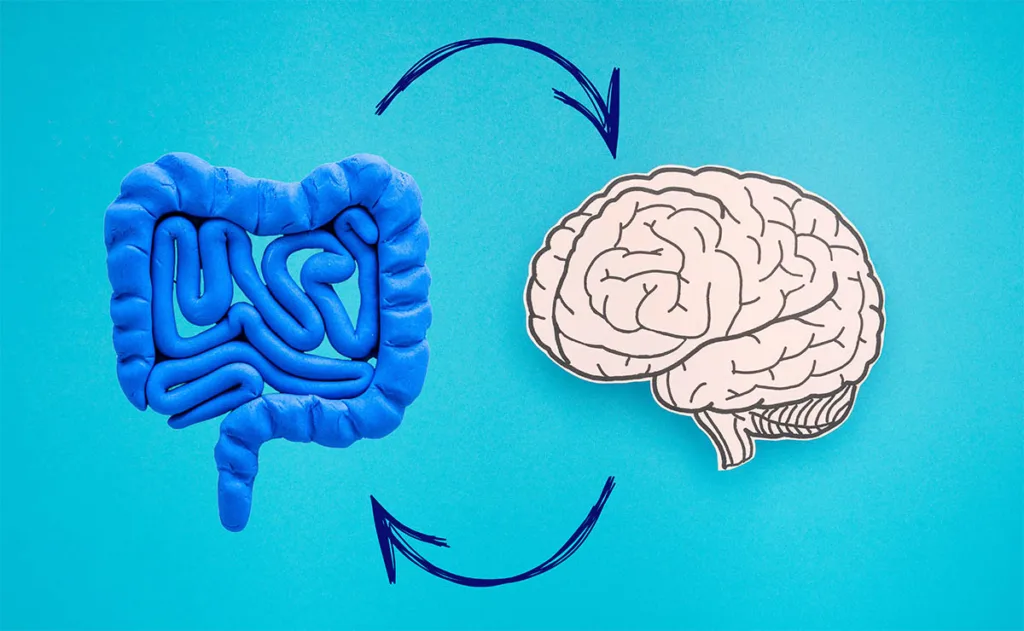What is Irritable Bowel Syndrome?
The basics of IBS
IBS is classified as a disorder of gut-brain interaction. This means that the communication between the brain and the gut has become dysfunctional and is causing gut symptoms.

Irritable bowel syndrome is a common gastrointestinal disorder. You are probably already well aware that its symptoms are abdominal pain, constipation and/or diarrhea, and often also bloating and/or distention. What causes IBS is not well understood, but it is known that in IBS there are no visible structural changes in the gut or tests that can be taken to diagnose IBS. So, because there is no “organic” cause for IBS, it has been classified as a functional gut disorder (1). More recently however, IBS is being called a disorder of gut-brain interaction (2), which means that it has been identified that while there are no obvious changes to the gut, there is a problem in the two-way communication between the gut and the brain that influence them both, causing symptoms.

Every tenth person globally has IBS

IBS is very common. Some estimates suggest that 7-15% of the population worldwide have IBS. It is more common in women than men and in those with a lower socioeconomic status, and it is usually diagnosed before the age of 50.
IBS goes often undiagnosed, as IBS symptoms might be embarrassing to talk to doctors about, or many fear that the doctor will not believe them. The problem can also be that one may continue to look for other causes behind their symptoms, which can be expensive and stressful, if the IBS diagnosis and test results are not convincing enough. It’s hard to hear the doctor say “there’s nothing wrong with you” when tests come out clean, when clearly there is something wrong.
Though IBS is not a life-threatening condition, nor does it reduce life expectancy, it can have a huge negative effect on daily life – you probably know this all too well. What’s perhaps worse, is that the nature of IBS symptoms is variable: the symptoms can resolve for some time and then return, they can fluctuate in severity, they can change, and even new symptoms may occur. Sometimes this fluctuation is more stressful than the symptoms themselves, especially when it comes to diarrhea. Because of all this, many people end up canceling plans or trips, it can affect their work, and mental health (depression/anxiety) and what they eat. Personal relationships may suffer, as well as sleep. (2,4)
Symptoms and diagnosis of IBS
As you already know, the symptoms of IBS include bloating, abdominal distention, constipation, diarrhea (or going back and forth between constipation and diarrhea), lower abdominal pain, and excessive gassiness. But making an IBS diagnosis is not the easiest one – no test will tell us that we have IBS.
To diagnose IBS, there are two things that are assessed (5):
- Rome IV criteria for diagnosis
- Ruling out of other more dangerous diseases of the gut that have similar symptoms as IBS
Rome IV criteria: For positive diagnosis, it required that there has been recurrent abdominal pain on average at least 1 day/week in the last 3 months*, associated with two or more of the following criteria:
- Pain is related to defecation
- Pain is associated with a change in the frequency of stool
- Pain is associated with a change in the form (appearance) of stool
*Criteria must be fulfilled for the last 3 months, with symptom onset at least 6 months prior to diagnosis
IBS subtyping: IBS can be divided into four groups
| IBS with predominant constipation (IBS-C) | >25% of bowel movements with Bristol stool form types 1 or 2 AND < 25% of bowel movements with Bristol stool form types 6 or 7 |
| IBS with predominant diarrhea (IBS-D) | >25% of bowel movements with Bristol stool form types 6 or 7 AND < 25% of bowel movements with Bristol stool form types 1 or 2 |
| IBS with mixed bowel habits (IBS-M) | >25% of bowel movements with Bristol stool form types 1 or 2 AND > 25% of bowel movements with Bristol stool form types 6 or 7 |
| IBS unclassified (IBS-U) | Patients who meet diagnostic criteria for IBS but whose bowel habits cannot be accurately categorized into 1 of the 3 groups above |
The Bristol Stool Chart:

Use the Bristol Stool Chart to evaluate your poop. Type 1 and 2 indicate constipation, types 3-5 are considered normal and type 6-7 are typical in diarrhea.
Red flags
Talk with your doctor, if you have any of the following signs/symptoms, even if you have been diagnosed with IBS (unless it has already been investigated):

- Weight loss
- Family history of bowel diseases (not IBS)
- Bloody stools, black tarry stools, rectal bleeding, anemia
- Symptoms started after you turned 50 years old
- Having bowel movements at night
- Persistent and severe daily diarrhea
- Recurrent vomiting
- Fever
- Symptoms that are getting worse or are very severe
The fact that so many other bowel diseases have similar symptoms to IBS is why it’s worth mentioning again that you should never self-diagnose IBS – it could delay right treatment, lead to ineffective treatment (+money spent) and there can be complications. This is important also when considering dietary changes: for example you should not start a gluten free diet if you haven’t been tested for celiac disease – celiac disease testing this requires you to have gluten in your daily diet for the test to be reliable.
If you do have an IBS diagnosis, and you have tried EVERYTHING to ease the symptoms without success, a study that I found suggests it might not be a bad idea to check for other explanations (again), such as inflammatory bowel disease, bile acid diarrhea or pancreatic insufficiency (6). For women, another condition that would be important to rule out is endometriosis, which has very similar symptoms to IBS, but also often includes problems with menstruation, back and/or pelvic pain, and infertility. Constipation is common in pelvic floor dysfunctions, so with constipation it is important to rule out this disorder also. (8)
I hope you now have a good understanding on the basic IBS facts. On the next page I will dive deeper into the mechanics of IBS: the gut changes (not big enough to detect by a test necessarily) that are suggested to bring about IBS symptoms.